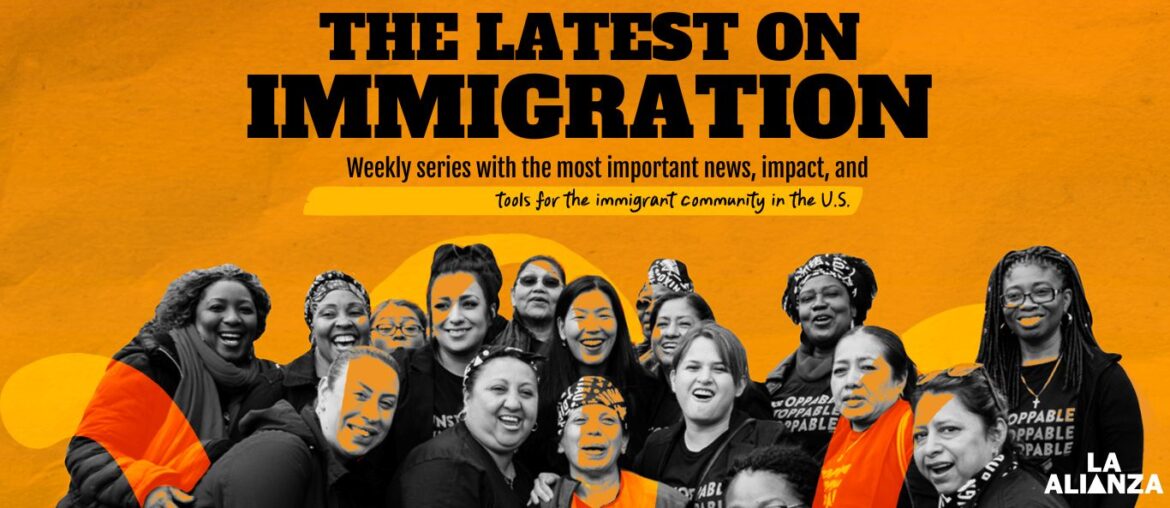During the first half of July, far-reaching measures were announced that could affect migrant families across the country. A presidential order on birthright citizenship was blocked in court, while a new federal law was passed that increases the budget for detention and deportation and imposes new fees on immigration procedures. In addition, protections for people from Honduras and Nicaragua were eliminated, and historic delays were reported in the replacement of Green Cards.
Recent News
Judge blocks Trump’s order on birthright citizenship
- What we know: A federal judge in New Hampshire has authorized a class action lawsuit against President Trump’s executive order seeking to restrict birthright citizenship for children of immigrants. The measure, which had been reactivated following a recent Supreme Court ruling, has been temporarily suspended while the case is resolved. The lawsuit, filed by the American Civil Liberties Union (ACLU), argues that this policy contradicts the 14th Amendment to the Constitution.
- Why it matters: The executive order was scheduled to take effect on July 27 and is part of a broader strategy to reduce citizenship rights. This is one of the current administration’s most radical proposals on immigration.
- Who it affects: If implemented, the measure would apply to babies born in the US whose parents do not have legal immigration status at the time of birth, denying them automatic access to citizenship. So far, there has been no indication that it would impact minors who have already obtained citizenship. The current ruling temporarily halts its implementation and gives families a respite while the case is resolved in court.
Trump signs the “Big Beautiful Bill” with new funds for immigration control and higher fees
- What we know: On July 4, President Trump signed H.R. 1, also known as the “Big Beautiful Bill,” which allocates more than $170 billion to immigration enforcement actions. The bill includes the construction of detention centers, the hiring of agents, and the expansion of the border wall. It also imposes new mandatory fees for asylum applications, TPS, and appeals, with additional charges for each year the application is pending. In addition, several immigration fees cannot be reduced or waived, eliminating access to payment exemptions for low-income individuals.
- Why it matters: This law transforms the immigration system into a mandatory payment model. An asylum seeker, for example, will have to pay at least $100 per year for as long as their case is unresolved. It also limits the number of immigration judges, which could lead to more delays in the courts.
- What you can do: The organization American Immigration Council has published a guide on how this law affects immigration fees.
- Who it affects: The new fees and restrictions directly affect people seeking humanitarian protection, low-income migrant families, and communities that depend on legal channels to regularize their status.
Trump’s administration eliminates TPS for people from Honduras and Nicaragua
- What we know: The Department of Homeland Security (DHS) announced on July 5 that it will not renew Temporary Protected Status (TPS) protection for more than 72,000 Hondurans and 4,000 Nicaraguans. According to DHS, the conditions under which TPS was granted “no longer exist.” However, work permits will remain valid until early September. TPS was granted in 1999 after Hurricane Mitch, one of the most devastating tragedies to hit Central America.
- Why it matters: This decision ends immigration protection that, for more than 25 years allowed thousands of people to live and work legally in the United States. The end of the program forces those who were protected under this status to find another legal way to remain in the country, or face the possibility of deportation.
- What you can do: People in the process of deportation should seek immediate legal advice and stay tuned for judicial updates. In addition, experts recommend not making hasty decisions and verifying all legal options.
- Who it affects: The cancellation impacts some 80,000 people. The loss of TPS creates legal and emotional uncertainty for those who have no other way to regularize their immigration status.
The time required to replace a Permanent Resident Card (Green Card) has increased dramatically
- What we know: According to recent USCIS data, the wait time to renew or replace a permanent resident card (Form I-90) increased by nearly 1,000% between January and March 2025, from less than a month to more than eight months. At the end of the quarter, there were more than 356,000 pending applications.
- Why it matters: An expired or pending green card can make it difficult to prove immigration status, limit access to employment, and delay other procedures. Although USCIS automatically extended the validity for 36 months, many people are unaware of this protection.
- Who it affects: This delay impacts permanent residents who need to renew their documents due to expiration, loss, or damage, especially those who require proof of status to work, travel, or renew licenses.
Developing Stories and Local News
These are news items and legislation that, to date, are still in the process of being approved or developed. Details may change:
- Decline in migrant workforce impacts key sectors: The latest employment report revealed a decline of more than 700,000 workers born outside the US since January. The report cites recent immigration restrictions as one of the factors behind the slowdown in economic growth. Sectors such as healthcare, agriculture, and services have reported difficulties in hiring staff, while experts warn that the lack of migrant workers is not being offset by increased labor participation among people born in the country.
- New ICE policy seeks to eliminate bail hearings for detained immigrants: An internal memo instructs immigration judges to keep people without legal status in detention throughout their deportation process, without the possibility of applying for bail. Although some judges have rejected this interpretation, ICE has appealed the decisions and continues to apply the guidance in several regions of the country. Legal organizations anticipate litigation in federal courts.
- Government appeals court order limiting arrests without apparent cause: The Department of Justice has requested that a California judge’s ruling restricting immigration arrests based on criteria such as language, appearance, or location be suspended. The court decision, which only applies to seven counties in the state, requires ICE to establish “reasonable suspicion” before detaining someone. The appeal argues that the ruling interferes with the functions of the executive branch.
- New detention center in Florida has been denounced for inhumane conditions: In just eight days, the state of Florida built a new detention center in the Everglades, called “Alligator Alcatraz.” The facility already houses more than 900 people and has been denounced by lawmakers as unsanitary and dangerous. During a visit, they reported cages with up to 32 people, high temperatures, food shortages, insect infestations, and lack of medical access.
The numbers
- According to the latest Gallup report, 79% of the general population in the United States believes that immigration is positive for the country, the highest level ever recorded.
Resources
- Visit the National Domestic Workers Alliance’s “Know Your Rights” platform, which includes immigrant rights, immigration options, a legal aid directory, and more. To access it, visit ndwa.us/immigrant
Note: The National Domestic Workers Alliance is the partner organization of La Alianza - Learn how to recognize fake news about immigration and avoid misinformation with this guide: How to Identify Fake News About Immigration and Avoid Misinformation
Legal Disclaimer: This information is provided for educational purposes and does not constitute legal advice. It is recommended that you consult with an immigration attorney to assess your specific situation.


